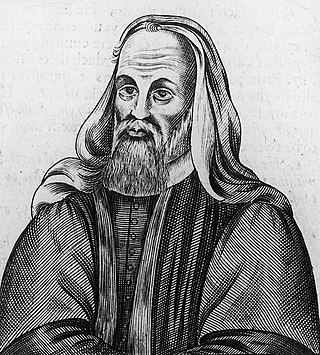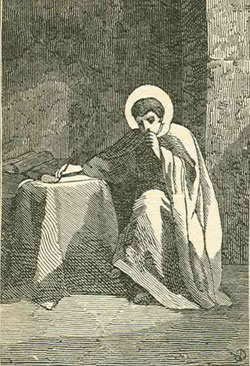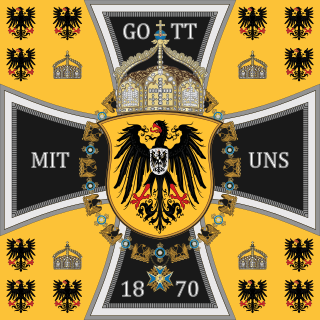
Augustine of Hippo, also known as Saint Augustine, was a theologian and philosopher of Berber origin and the bishop of Hippo Regius in Numidia, Roman North Africa. His writings influenced the development of Western philosophy and Western Christianity, and he is viewed as one of the most important Church Fathers of the Latin Church in the Patristic Period. His many important works include The City of God, On Christian Doctrine, and Confessions.

Jihad is an Arabic word which literally means "exerting", "striving", or "struggling", especially with a praiseworthy aim. In an Islamic context, it can refer to almost any effort to make personal and social life conform with God's guidance, such as internal struggle against evil in oneself, efforts to build a good Muslim community (ummah), and struggle to defend Islam. In non-Muslim societies, the term is most often associated with offensive warfare and violence.

Pelagianism is a Christian theological position that holds that the fall did not taint human nature and that humans by divine grace have free will to achieve human perfection. Pelagius, an ascetic and philosopher from the British Isles, taught that God could not command believers to do the impossible, and therefore it must be possible to satisfy all divine commandments. He also taught that it was unjust to punish one person for the sins of another; therefore, infants are born blameless. Pelagius accepted no excuse for sinful behaviour and taught that all Christians, regardless of their station in life, should live unimpeachable, sinless lives.
The problem of evil is the philosophical question of how to reconcile the existence of evil and suffering with an omnipotent, omnibenevolent, and omniscient God. There are currently differing definitions of these concepts. The best known presentation of the problem is attributed to the Greek philosopher Epicurus. It was popularized by David Hume.

In the philosophy of religion, a theodicy is an argument that attempts to resolve the problem of evil that arises when all power and all goodness are simultaneously ascribed to God.

The Battle of Crécy took place on 26 August 1346 in northern France between a French army commanded by King Philip VI and an English army led by King Edward III. The French attacked the English while they were traversing northern France during the Hundred Years' War, resulting in an English victory and heavy loss of life among the French.

The just war theory is a doctrine, also referred to as a tradition, of military ethics that aims to ensure that a war is morally justifiable through a series of criteria, all of which must be met for a war to be considered just. It has been studied by military leaders, theologians, ethicists and policymakers. The criteria are split into two groups: jus ad bellum and jus in bello. The first group of criteria concerns the morality of going to war, and the second group of criteria concerns the moral conduct within war. There have been calls for the inclusion of a third category of just war theory dealing with the morality of post-war settlement and reconstruction. The just war theory postulates the belief that war, while it is terrible but less so with the right conduct, is not always the worst option. Important responsibilities, undesirable outcomes, or preventable atrocities may justify war.

Prosper of Aquitaine, also called Prosper Tiro, was a Christian writer and disciple of Augustine of Hippo, and the first continuator of Jerome's Universal Chronicle.

The crusading movement encompasses the framework of ideologies and institutions that described, regulated, and promoted the Crusades. The crusades were religious wars that the Christian Latin church initiated, supported, and sometimes directed during the Middle Ages. The members of the church defined this movement in legal and theological terms that were based on the concepts of holy war and pilgrimage. In theological terms, the movement merged ideas of Old Testament wars, that were believed to have been instigated and assisted by God, with New Testament ideas of forming personal relationships with Christ. The institution of crusading began with the encouragement of the church reformers who had undertaken what is commonly known as the Gregorian Reform in the 11th century. It declined after the 16th century Protestant Reformation.

On the City of God Against the Pagans, often called The City of God, is a book of Christian philosophy written in Latin by Augustine of Hippo in the early 5th century AD. The book was in response to allegations that Christianity brought about the decline of Rome and is considered one of Augustine's most important works, standing alongside The Confessions, The Enchiridion, On Christian Doctrine, and On the Trinity. As a work of one of the most influential Church Fathers, The City of God is a cornerstone of Western thought, expounding on many questions of theology, such as the suffering of the righteous, the existence of evil, the conflict between free will and divine omniscience, and the doctrine of original sin.
Semi-Pelagianism is a historical Christian theological and soteriological school of thought about the role of free will in salvation. In semipelagian thought, a distinction is made between the beginning of faith and the increase of faith. Semi-Pelagian thought teaches that the latter half – growing in faith – is the work of God, while the beginning of faith is an act of free will, with grace supervening only later.

Gott mit uns is a phrase commonly used in heraldry in Prussia and later by the German military during the periods spanning the German Empire (1871–1918), Weimar Republic (1918–1933), and Nazi Germany (1933–1945). It was also commonly used by Sweden in most of its wars and especially as a battle cry during the Thirty Years' War.

The history of the Calvinist–Arminian debate begins in the early 17th century in the Netherlands with a Christian theological dispute between the followers of John Calvin and Jacobus Arminius, and continues today among some Protestants, particularly evangelicals. The debate centers around soteriology, or the study of salvation, and includes disputes about total depravity, predestination, and atonement. While the debate was given its Calvinist–Arminian form in the 17th century, issues central to the debate have been discussed in Christianity in some form since Augustine of Hippo's disputes with the Pelagians in the 5th century.

In Christianity, the Devil is the personification of evil. He is traditionally held to have rebelled against God in an attempt to become equal to God himself. He is said to be a fallen angel, who was expelled from Heaven at the beginning of time, before God created the material world, and is in constant opposition to God. The devil is conjectured to be several other figures in the Bible including the serpent in the Garden of Eden, Lucifer, Satan, the tempter of the Gospels, Leviathan, and the dragon in the Book of Revelation.
Robert L. Holmes is a Professor Emeritus of Philosophy at the University of Rochester, and an expert on issues of peace and nonviolence. Holmes specializes in ethics, and in social and political philosophy. He has written numerous articles and several books on those topics, and has been invited to address national and international conferences.

Christians have had diverse attitudes towards violence and nonviolence over time. Both currently and historically, there have been four attitudes towards violence and war and four resulting practices of them within Christianity: non-resistance, Christian pacifism, just war, and preventive war. In the Roman Empire, the early church adopted a nonviolent stance when it came to war because the imitation of Jesus's sacrificial life was preferable to it. The concept of "Just War", the belief that limited uses of war were acceptable, originated in the writings of earlier non-Christian Roman and Greek thinkers such as Cicero and Plato. Later, this theory was adopted by Christian thinkers such as St Augustine, who like other Christians, borrowed much of the just war concept from Roman law and the works of Roman writers like Cicero. Even though "Just War" concept was widely accepted early on, warfare was not regarded as a virtuous activity and expressing concern for the salvation of those who killed enemies in battle, regardless of the cause for which they fought, was common. Concepts such as "Holy war", whereby fighting itself might be considered a penitential and spiritually meritorious act, did not emerge before the 11th century.

The Augustinian theodicy, named for the 4th- and 5th-century theologian and philosopher Augustine of Hippo, is a type of Christian theodicy that developed in response to the evidential problem of evil. As such, it attempts to explain the probability of an omnipotent (all-powerful) and omnibenevolent (all-loving) God amid evidence of evil in the world. A number of variations of this kind of theodicy have been proposed throughout history; their similarities were first described by the 20th-century philosopher John Hick, who classified them as "Augustinian". They typically assert that God is perfectly (ideally) good, that he created the world out of nothing, and that evil is the result of humanity's original sin. The entry of evil into the world is generally explained as consequence of original sin and its continued presence due to humans' misuse of free will and concupiscence. God's goodness and benevolence, according to the Augustinian theodicy, remain perfect and without responsibility for evil or suffering.
Pseudo-Augustine is the name given by scholars to the authors, collectively, of works falsely attributed to Augustine of Hippo. Augustine himself in his Retractiones lists many of his works, while his disciple Possidius tried to provide a complete list in his Indiculus. Despite this check, false attributions to Augustine abound.

Augustinianism is the philosophical and theological system of Augustine of Hippo and its subsequent development by other thinkers, notably Boethius, Anselm of Canterbury and Bonaventure. Among Augustine's most important works are The City of God, De doctrina Christiana, and Confessions.
Augustinian soteriology, influenced by Augustine of Hippo early engagements with Stoicism, Neoplatonism, and Manichaeism, played a crucial role in shaping Christian theology. Initially opposing deterministic views, Augustine later integrated aspects of these philosophies, especially during his disputes with the Pelagians. His doctrines, such as predestination by predeterminism, laid the groundwork for later theological developments. Augustine's influence on John Calvin was particularly significant in shaping Calvinist soteriology and understanding of divine providence.














